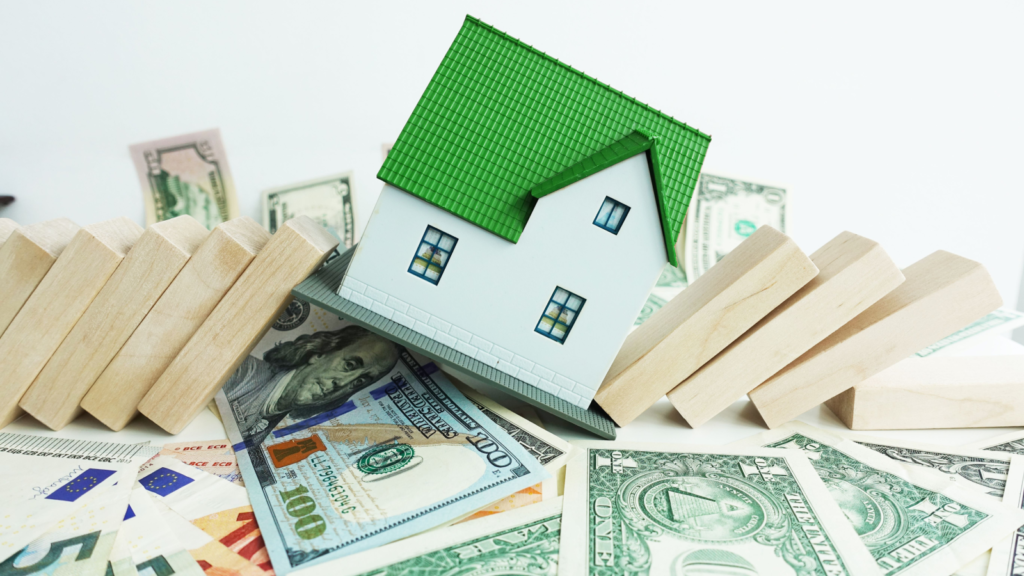
Everyone continues to look for evidence that the housing market will crash later this year or in 2024. Identifying incontrovertible evidence is essentially impossible.
Investors and economists are forced to look at past precedents in attempting to determine future outcomes. Thus, economists today are stuck referring to the 2008 crash to ascertain the health of the 2023 housing market. The lessons of the subprime crisis don’t correlate perfectly to those we’re experiencing today.
Instead, we’re dealing with new circumstances and a host of data related to what is a different market. That said, there are some clear signs pointing to the idea that the housing market will crash in 2024.
Late 2023 Recession Prompts 2024 Crash

The price at which U.S. homes sold has fallen after peaking in Q4 of last year at $479,500. That figure fell to $429,000 to end of the first quarter of 2023 and again to $416,100 at the end of the second quarter. The reduction in prices absent a crash has prompted some, including the chief economist of the National Association of Realtors, Lawrence Yun, to declare that the housing recession is over. Home prices increased in July despite the overall decline in Q2. That suggests that a falling out of the bottom in prices is unlikely.
Ignore Mr. Yun’s obvious bias as chief economist of the National Association of Realtors. Instead, consider that the chance of recession remains elevated. Most economists expect a recession of some magnitude to occur. The issue is timing it could be late this year or perhaps by the middle of next year. Whatever the case, job losses will ensue and that will trigger defaults that have every bit of potential to trigger a housing crash.
Cooling Jobs Market

The cooling jobs market poses a threat to the economy and in turn the housing market. August unemployment increased to 3.8% from 3.5% in July. That makes it increasingly likely that the Fed will hold interest rates steady this month. It also increases pressure on households raising the likelihood of missed mortgage payments and thus the potential for foreclosures.
The more difficult it becomes to secure jobs the worse everything that drives the economy becomes. A 0.3% month-to-month increase may not seem particularly substantial but the effects could be severe.
Homebuyers are already hampered by high mortgage rates. That is preventing many would-be buyers from getting into homes. However, mortgage rates probably won’t immediately jump drastically given that the Fed can’t raise rates in September. And further mortgage rate increases could prompt prices to drop quickly. That would suggest that a crash is unlikely soon. Yet, higher unemployment also serves to cool prices because demand falls. Fewer jobs equals fewer buyers. Thus, rising unemployment could trigger a crash.
A Reinflation of the housing bubble

Perhaps nothing is more concerning about the housing bubble than the fact that the experts essentially have no idea of what to expect. Polling varies wildly in regard to expectations of a housing crash. There is very little with which to concretely substantiate an opinion either way. One important factor that suggests trouble is a reinflating pricing bubble.
The reason to believe that may be happening lies in rising sales of new single-family houses that jumped by 4.4% in July. Rising sales trigger increasing demand which serves to raise prices. If one thing is abundantly clear it’s that there are very few pieces of clear-cut evidence with which to draw convincing conclusions about a housing crash.
The potential for a reinflation of prices is a real issue. If prices move higher that means the Fed has been ineffective in pushing mortgage rates higher. Beyond that and all of the other issues discussed here, there’s also the issue of the unknown. Black swan events occur. Few people were worried about the subprime crisis until it happened.
On the date of publication, Alex Sirois did not have (either directly or indirectly) any positions in the securities mentioned in this article. The opinions expressed in this article are those of the writer, subject to the InvestorPlace.com Publishing Guidelines.




